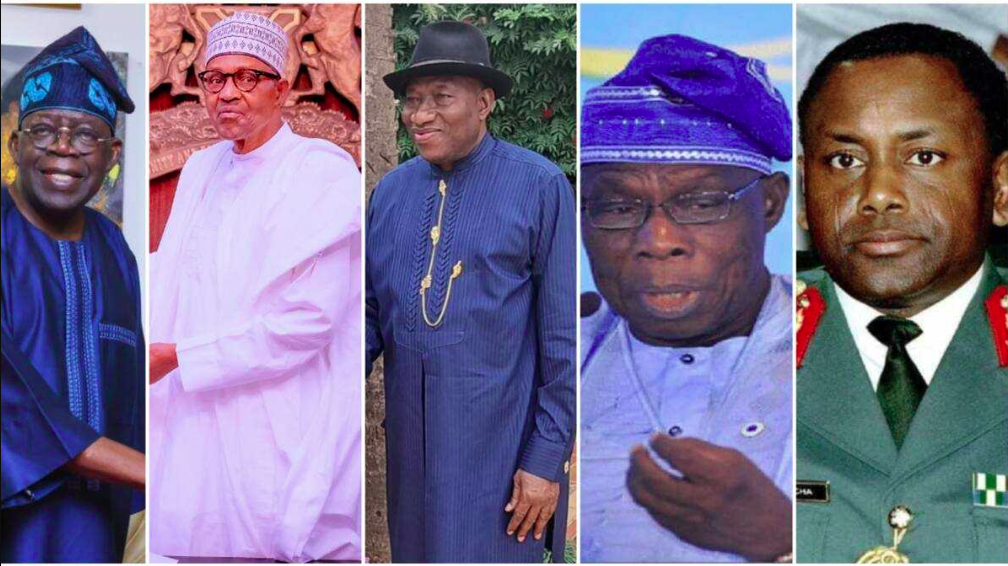Since the death of General Sani Abacha in 1998, Nigeria has been governed by several heads of state, each leaving a distinct mark on the country’s development. Their policies, leadership styles, and challenges have shaped the lives and future of Nigerians. While some administrations have made significant progress, others have been plagued by corruption, mismanagement, and public dissatisfaction.
Here, we’ll provide an in-depth analysis of Nigeria’s past presidents and their roles, achievements, and shortcomings. It also highlights whose leadership was the most effective and gives a powerful message to Nigerians on self-reliance and nation-building.
1. Nigeria’s Past Heads of State and Their Impact
Since 1998, Nigeria has had the following presidents:
1. General Abdulsalami Abubakar (1998-1999) – Transition to Democracy
Key Achievements:
✅ Conducted the 1999 elections that ushered in civilian rule after years of military dictatorship.
✅ Released many political prisoners, including Olusegun Obasanjo, who later became president.
✅ Strengthened Nigeria’s foreign relations after years of isolation under Abacha.
🔴 Challenges:
-
His tenure was brief (11 months), leaving limited room for long-term impact.
-
Weak economic foundation, leading to continued poverty in Nigeria.
2. Olusegun Obasanjo (1999-2007) – Economic Reform and Debt Relief
Key Achievements:
✅ Secured $18 billion debt relief from the Paris Club, reducing Nigeria’s debt burden.
✅ Introduced economic policies that led to Nigeria’s first major telecommunications boom (MTN, Glo, etc.).
✅ Revived the banking sector through bank consolidations and financial reforms.
✅ Established anti-corruption agencies like the EFCC and ICPC.
🔴 Challenges:
-
Attempted to extend his tenure for a third term, which was widely opposed.
-
Corruption remained a major issue, with allegations of mismanagement.
-
Failed to fix Nigeria’s power sector, despite promising improvements.
3. Umaru Musa Yar’Adua (2007-2010) – The Visionary Leader Cut Short
Key Achievements:
✅ Launched the Niger Delta Amnesty Program, reducing militancy in the oil-producing region.
✅ Introduced the Seven-Point Agenda focused on energy, security, and infrastructure.
✅ Was honest and transparent, openly declaring his assets (a rare act among Nigerian presidents).
🔴 Challenges:
-
Struggled with health issues, spending much of his presidency seeking medical treatment abroad.
-
His government lacked decisiveness and speed in implementing policies.
-
Died in May 2010, cutting his presidency short.
4. Goodluck Jonathan (2010-2015) – The Man of Many Contradictions
Key Achievements:
✅ Expanded education and access to universities, especially in the North.
✅ Supervised Nigeria’s biggest economic growth period, making Nigeria the largest economy in Africa in 2014.
✅ Conducted free and fair elections in 2015, marking the first time an incumbent peacefully conceded defeat.
🔴 Challenges:
-
Boko Haram insurgency escalated under his administration, leading to the Chibok schoolgirls’ kidnapping in 2014.
-
Widespread corruption, especially in the oil sector, with billions of dollars unaccounted for.
-
Poor handling of national security and economic stability.
5. Muhammadu Buhari (2015-2023) – Anti-Corruption and Economic Struggles
Key Achievements:
✅ Strengthened the fight against corruption, recovering stolen public funds.
✅ Expanded infrastructure projects, including roads, railways, and bridges.
✅ Led a major crackdown on Boko Haram, reducing their territorial control.
🔴 Challenges:
-
Mass unemployment and inflation surged during his tenure.
-
Worsening insecurity, with banditry and kidnappings becoming rampant.
-
Spent extended periods in the UK for medical treatment, raising concerns about leadership stability.
-
Economic hardship, with the naira depreciating significantly against the dollar.
6. Bola Ahmed Tinubu (2023-Present) – The New Era
Ongoing Developments:
✅ Removed fuel subsidies, aiming for long-term economic stability.
✅ Engaged in diplomatic relations, seeking investments and economic growth.
✅ Working on security reforms to tackle insurgency and crime.
🔴 Concerns:
-
Economic hardship due to subsidy removal.
-
Concerns over government transparency and effectiveness.
2. Whose Administration Was the Best?
While each president contributed uniquely, Olusegun Obasanjo’s administration (1999-2007) is widely considered the most impactful.
Why Obasanjo’s Era Stands Out:
✔ Secured debt relief, freeing Nigeria from billions of dollars in foreign debt.
✔ Boosted telecommunications, leading to massive job creation.
✔ Established anti-corruption agencies that are still active today.
✔ Promoted private sector growth, stabilizing the economy.
However, no administration has completely solved Nigeria’s challenges, as corruption, insecurity, and economic struggles persist.
3. The Key Message: Nigerians Must Build Their Own Future
While leaders play a crucial role in national development, Nigerians must take charge of their own progress. Here’s how:
1. Invest in Education and Skills
-
Governments come and go, but knowledge remains.
-
Nigerians should develop skills in business, technology, and innovation to succeed.
2. Promote Entrepreneurship
-
Waiting for government jobs is risky—create your own opportunities.
-
Invest in small businesses, farming, and digital enterprises to achieve financial independence.
3. Demand Accountability from Leaders
-
Elections matter—vote wisely based on policies, not ethnicity or religion.
-
Support transparent governance and civic engagement.
4. Prioritize Unity and Security
-
Religious and ethnic conflicts weaken Nigeria.
-
Nigerians should work together to build a peaceful and prosperous nation.
5. Take Advantage of Global Opportunities
-
The world is digital—leverage online work, e-commerce, and freelancing.
-
Learn financial management and investment strategies for long-term growth.
Conclusion: Nigeria’s Future Is in Its People’s Hands
Since 1998, Nigeria has seen six different presidents, each with strengths and weaknesses. While some improved the economy, others failed to tackle insecurity and corruption. The truth is, no single leader can magically fix Nigeria—the responsibility lies with every Nigerian.
To move forward, education, entrepreneurship, unity, and political awareness must be embraced. Waiting for the government is not an option—every citizen must play a role in building a better Nigeria for future generations.
The future of Nigeria is not in Aso Rock—it’s in the hands of its people.
Last Updated on March 28, 2025 by kingstar





